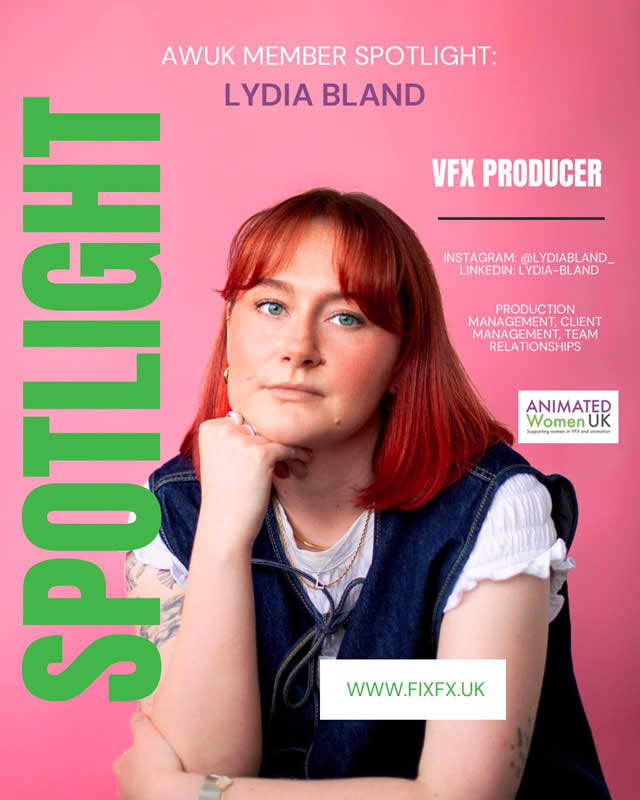
Spotlight: Lydia Bland
What's your name and what area of VFX or animation do you work in?:
My name is Lydia Bland and I work vendor-side as a VFX Producer.
What was your journey into the VFX or animation industry? What got you into VFX or animation?:
I went to the University of East Anglia and studied French and Film and Television (BA). I started out with a passion for storytelling and post-production, and my journey into the industry began in 2019 as a Production Trainee at Inside Job Productions in London, through a Creative Access Traineeship. This opportunity gave me my footing in the industry. From there, I moved into the commercial world, working as a Production Assistant and Editor before taking on my first role as a VFX Editor. I eventually transitioned from editorial into production, and over time found myself increasingly drawn to the structure, problem-solving, and people-facing side of VFX. It was a natural shift—one that's allowed me to bring my eye for detail and my understanding of the editorial pipeline into the production space.
What does a typical day look like in your role?:
Every day is different, but usually involves a combination of: bidding, scheduling, team meetings, client calls, admin and emails. It's a lot of plate-spinning, but that's part of what makes it engaging—there's always something new to solve or adapt to.
What skills do you think are most important for your role?:
A positive mindset, proactive initiative, autonomous thinking, assertive communication, multitasking under pressure, emotional intelligence and resilience, a good sense of humour, and strong problem-solving skills are all essential for staying grounded and focused in a fast-paced, high-pressure production environment.
What tools or software do you use daily? Is this what you started working in or have you pivoted to this one?:
AI notetaking assistants like Gemini (as part of G Suite) have become a real asset in recent months. They help streamline my workload and allow me to stay fully present in meetings—without needing to scramble to take detailed notes or rely on someone else. It's a small shift that's had a big impact on how I manage my time and capacity.
What's your favourite part of your job/career so far?:
I love the people. Collaborating with artists, supervisors, and producers across departments is one of the most rewarding parts of the job. There's something special about watching talented people come together to make something incredible—and knowing that, behind the scenes, you helped create the environment that made that possible.
What's a common misconception about your job?:
Working in VFX is always lucrative. While there are success stories, most people work in VFX because they're passionate about it—not because it's a financial goldmine. It's creative, it's collaborative, and it's constantly evolving, which is what makes people stay. But the love for the craft often outweighs the financial incentive.
What challenges have you met as a woman in the industry?:
There have been moments when I've had to work twice as hard as a woman to be taken seriously or felt the weight of gendered expectations in leadership roles. Assertiveness in women is often mistaken for being confrontational or overly emotional—a persistent and damaging double standard. I've also experienced firsthand how stress and mental health challenges disproportionately affect women in the workplace. Women are twice as likely as men to need time off work due to stress, depression, or anxiety. Through my own experiences, I've learned to stand firm in my values and advocate for myself and others facing similar situations.
What's one piece of advice you wish you'd received earlier?:
Challenges should be viewed as opportunities for growth and learning, rather than obstacles that undermine your capability or self-worth. It might sound cliché, but everything happens for a reason—even if that reason isn't clear right away.
How do you balance work with your personal life?:
Setting boundaries is key. I've learned the power of saying no, protecting my energy, and managing my time in a way that helps prevent burnout. Self-care is more than stealing quick moments for yourself—it's also about therapy, deep rest, mindfulness, meditative techniques, and surrounding yourself with people and environments that serve you.
What's one stereotype you'd love to break about your field?:
The idea that individuals with mental health challenges or neurodivergence can't thrive in high-pressure environments is simply untrue—many of the most brilliant minds in our industry are neurodivergent, and we must support rather than sideline that talent by fostering healthier, more inclusive working environments and better business practices.

